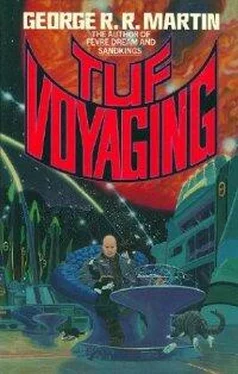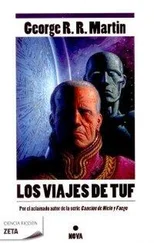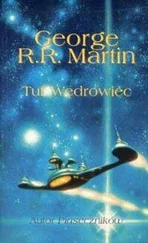But tonight she had a starscape spread across her wall, and against it was outlined the grim metallic majesty of the immense starship called Ark. Even a screen as large as hers—one of the perks of her status as Portmaster—could not really convey the ship’s sheer size.
And the things it represented—the hope, the threat—were immeasurably bigger than the Ark itself, Tolly Mune knew.
Off to her side, she heard the buzzing of her comm unit. The computer would not have disturbed her unless it was the call she had been waiting for. “I’ll take it,” she said. The stars blurred, the Ark dissolved, and the vidscreen ran with liquid colors for an instant before resolving itself into the face of First Councillor Josen Rael, majority leader of the Planetary High Council.
“Portmaster Mune,” he said. At this merciless magnification, she could see all the tension in his long neck, the tightness around the thin lips, the hard glitter in his dark brown eyes. The top of his head, domed and balding, had been powdered, but was beginning to sweat nonetheless.
“Councillor Rael,” she replied. “Good of you to call. You’ve gone over the reports?”
“Yes. Is this call shielded?”
“Certainly,” she said. “Speak freely.”
He sighed. Josen Rael had been a fixture in planetary politics for a decade now. He had first made the newsfeeds as councillor for war, later had climbed to councillor for agriculture, and for four standard years he had been the leader of the council’s majority faction, the technocrats, and therefore the single most powerful man on S’uthlam. The power had made him look old and hard and tired, and this was the worst Tolly Mune had ever seen him. “You’re certain of the data, then?” he said. “ If our crews have made no mistake? This is too crucial for error, I don’t have to tell you that. This is truly an EEC seedship?”
“Damn right,” said Tolly Mune. “Damaged and in disrepair, yes, but the puling thing is still functional, more or less, and the cell library is intact. We’ve verified it.”
Rael ran long, blunt fingers through his thinning white hair. “I should be jubilant, I suppose. When this is over, I will have to pretend to be jubilant for the newsfeeds. But right now, all I can think of are the dangers. We’ve had a council meeting. Closed. We can’t risk too much getting out until the affair is settled. The council was largely in accord—technocrats, expansionists, zeros, the church party, the fringe factions.” He laughed. “I’ve never seen such unanimity in all the years I’ve served. Portmaster Mune, we must have that ship.”
Tolly Mune had known it was coming. She had not been Portmaster this long without understanding the politics of the society downstairs. S’uthlam had been locked into endless crisis all her life. “I’ll try to buy it for you,” she said. “This Haviland Tuf was a freelance trader originally, before he stumbled on the Ark. My crews found his old ship on the landing deck, in terrible shape. Traders are greedy abortions, every one of them. That should work for us.”
“Offer him whatever it takes,” said Josen Rael. “Do you understand, Portmaster? You have unlimited budgetary authority.”
“Understood,” said Tolly Mune. But there was another question to be asked. “And if he won’t sell?”
Josen Rael hesitated. “Difficult,” he muttered. “He must sell. A refusal would be tragic. Not for the man himself, but for us, perhaps.”
“If he won’t sell?” Tolly Mune repeated. “I need to know the alternatives.”
“We must have the ship,” Rael told her. “If this Tuf proves unreasonable, he gives us no choice. The High Council will exercise its right of eminent domain and confiscate. The man will be compensated, of course.”
“Damn. You’re talking about seizing the ship by force.”
“No,” said Josen Rael. “Everything would be proper—I’ve checked. In an emergency, for the good of the greatest number, the rights of private property must be set aside.”
“Oh, hell and damn, that’s puling rationalization, Josen,” said Mune. “You had more common sense when you were up here. What have they done to you downstairs?”
He grimaced, and for an instant, he looked a little like the young man who had worked at her side for a year, when she had been Deputy Portmaster and he third assistant administrator for interstellar trade. Then he shook his head, and the old, tired politician was back. “I don’t feel good about this, Ma,” he said, “but what choice do we have? I’ve seen projections. Mass famine within twenty-seven years unless we have a breakthrough, and there’s no breakthrough in sight. Before it comes to that, the expansionists will regain power and we’ll have another war, perhaps. Either way, millions will die—billions, perhaps. Against that, what are the rights of this one man?”
“I won’t argue that point, Josen, though there are those who would, you know that. But never mind. You want to be practical, I’ll give you some goddamned practical things to think over. Even if we buy this ship from Tuf legally, there’s going to be hell to pay with Vandeen and Skrymir and the rest of the allies, but I doubt that they’d try anything. If we grab it by force, though, that’s a set of coordinates to a whole different place—a hard place, too. They can say piracy, maybe. They can define the Ark as a military craft—which it was, by the way, and a puling world-buster, too—and say we’re in violation of the treaty and come after us again.”
“I’ll speak to their envoys personally,” said Josen Rael wearily. “Assure them that as long as the technocrats are in power, the colonization program will not be resumed.”
“And they’ll take your puling word? Like goddamned horny hell they will. And will you assure them that the technocrats are never going to lose power, that they’ll never have the expansionists to deal with again? How will you do that? Are you planning to use the Ark to establish a benevolent dictatorship?”
The councillor pressed his lips together tightly, and a flush crept up the back of his long, dark neck. “You know me better than that. Agreed, there are dangers. The ship is a formidable military resource, however. Let us not forget that. If the allies mobilize against us, we will hold the trump card.”
“Nonsense,” said Tolly Mune. “It has to be repaired and we have to master it. The technology involved has been lost for a thousand years. We’ll be studying it for months, maybe years, before we can really use the goddamned thing. Only we won’t get the chance. The Vandeeni armada will arrive within weeks to take it away from us, and the others won’t be far behind them.”
“None of this is your concern, Portmaster,” said Josen Rael coldly. “The High Council has discussed the issue thoroughly.”
“Don’t try and pull rank on me , Josen. Remember the time you got drunk on narco-blasters and decided you’d go outside and see how fast urine crystallized in space? I was the one who talked you out of freezing off your hose, esteemed First Councillor. Clean out your puling ears and listen to me. Maybe war isn’t my concern, but trade is. The port is our lifeline. We import thirty percent of our raw calories now—”
“Thirty-four percent,” Rael corrected.
“Thirty-four percent,” Tolly Mune agreed. “And that is going to go nowhere but up, we both know it. We pay for that food with our technological expertise—both manufactured goods and port profits. We service, repair, and build more starships than any other four worlds in the sector, and you know why? Because I’ve busted my puling buns to make sure we’re the best. Tuf himself said it. He came here for repairs because we had a reputation—a reputation for being ethical, honest, and fair, as well as technically competent. What’s going to happen to that reputation if we confiscate his puling ship? How many other traders are going to bring in their ships for repairs if we feel free to help ourselves to any we like? What’s going to happen to my goddamned port ?”
Читать дальше












